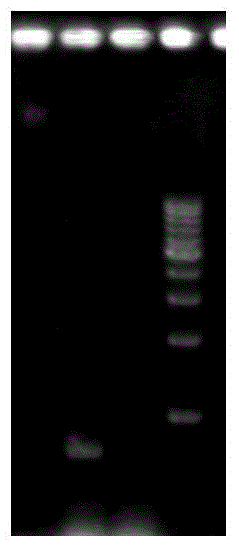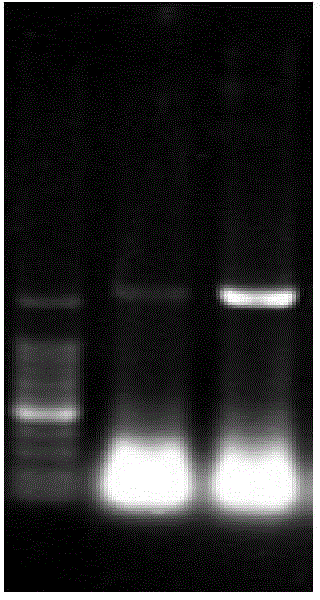Isoprene synthase gene and application thereof
A technology of isoprene and synthase, applied in the field of genetic engineering, can solve the problem of low efficiency of isoprene
- Summary
- Abstract
- Description
- Claims
- Application Information
AI Technical Summary
Problems solved by technology
Method used
Image
Examples
Embodiment 1
[0027] Embodiment 1: Obtaining of gene fragments
[0028] 1. Extraction of total RNA from oak leaves
[0029] Collect summer oak leaves, use RNeasy Plant Mini Kit (Qiagen company) to extract poplar leaf total RNA, carry out according to the kit instruction method, carry out electrophoresis ( figure 1 ) to verify the quality of RNA extraction, it can be seen that the integrity of the RNA is good, and subsequent experiments can be performed.
[0030] 2. RT-PCR
[0031] Take Oligo(dT) 20 As a reverse transcription primer, the nucleic acid was reverse transcribed into cDNA according to the reverse transcription kit SuperScript.III First-Strand Synthesis System for RT-PCR (Invitrogen Company) instructions;
[0032] The reaction system is as follows:
[0033] RNA 1 μg
[0034] 10mM dNTP 1μl
[0035] Oligo(dT)20 (0.5μg / μl) 1μl
[0036] 65°C for 5min, place on ice for 1min, add the following 10μl mix
[0037]
[0038] 50°C for 50min, 85°C for 15min, add 1μl RNase H, 37°C fo...
Embodiment 2
[0056] Example 2: Obtaining the full length of the QrIspS gene coding region
[0057] The method for obtaining full-length cDNA is SMARTer-RACE, using PCR cDNASynthesis Kit (Clontech Company) was carried out, and the primers and reagents used below were all except GSP Provided in the PCR cDNA Synthesis Kit, follow the kit instructions.
[0058] 1. Preparation of RACE-Ready cDNA
[0059] The reverse transcription system for the first strand of RACE-Ready cDNA is as follows:
[0060]
[0061]
[0062] 2. Design of gene-specific primers:
[0063] Design gene-specific primers (GSP) according to the sequence of the obtained QrIspS fragment, use RACE-Ready cDNA as a template, and use GSP and Universal Primer (Universal Primer Mix, UPM) as primers for amplification to obtain 3'-RACE cDNA fragments and 5'-RACE cDNA fragment. Primer position as Image 6 As shown, the black part in the middle is the sequence obtained by degenerate PCR, the black part on both sides is the u...
Embodiment 3
[0086] Embodiment 3: Construction of Escherichia coli isoprene production strain
[0087] The sequences of the full-length primers QRFa and QRRa are as follows:
[0088] QRFa: 5'GTCATGCCAATGGCGAGCAAACAAGTGCTTTC 3'
[0089] QRRa: 5'CGTCGACTGCAGCTAAAGGTGGATCTGGCTGTGG3'
[0090] 1. Construction of Escherichia coli expression vector pBAD-QrIspS
[0091] The QrIspS gene fragment obtained using primers QRFa and QRRa was subjected to NcoI and KpnI (TAKARA Company) double enzyme digestion, and the pBAD-HisB expression vector (purchased from Invitrogen Company) was subjected to NcoI and KpnI double enzyme digestion, and the QrIspS gene was connected to pBAD- The HisB vector was transformed into trans5α competent cells, and positive clones were selected for sequencing. The nucleotide sequence of pBAD-QrIspS is SEQ ID No.5.
[0092] 2. Construction of isoprene producing strain MV / pQrIspS
[0093] The constructed pBAD-QrIspS and plasmids p1 and p2 were co-transformed into the BW25113 ...
PUM
 Login to View More
Login to View More Abstract
Description
Claims
Application Information
 Login to View More
Login to View More - R&D
- Intellectual Property
- Life Sciences
- Materials
- Tech Scout
- Unparalleled Data Quality
- Higher Quality Content
- 60% Fewer Hallucinations
Browse by: Latest US Patents, China's latest patents, Technical Efficacy Thesaurus, Application Domain, Technology Topic, Popular Technical Reports.
© 2025 PatSnap. All rights reserved.Legal|Privacy policy|Modern Slavery Act Transparency Statement|Sitemap|About US| Contact US: help@patsnap.com



